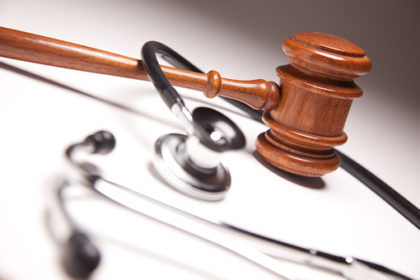
Following recent HIQA reports, in today’s blog I will discuss medical negligence in the context of MRSA. Medical Negligence is essentially an act or omission by a health care professional which is below the accepted standard of care and which results in injury or death to a patient.
Medical negligence can happen because of a number of reasons including:
1. Diagnosis – misdiagnosis or delayed diagnosis
2. Treatment – i.e. errors in the medical treatment such as incorrect medication, surgical errors, exposure
to infection (MRSA etc)
3. Disclosure – i.e. failure to inform the patient of the risks of the treatment of procedure
Treatment – Exposure to Infection
MRSA (Methicillin Resistant Staphylococcus Aureus)
MRSA is a bacteria that normally lives on the skin and is generally harmless on the skin. It is different to normal Staphylococcus Aureus because it is resistant to a wide range of antibiotic drugs and so if it leads to an infection, it is very hard to fight. When a person has a wound, the bacteria can pass from the outside of the body where they normally live to the inside where they cause a potentially dangerous infection.
Staphylococcus Aureus is not a particularly dangerous bacteria – it is to be found on about one third of the population’s skin. It only becomes dangerous if it invades a wound such as a surgical or injury wound and/or when the patient is weakened through illness. Such victims are more likely to be found in hospitals.
Infections are a relatively normal part of hospital care. It is not possible to treat patients in a completely sterile environment. Nevertheless, Irish hospitals have a very high incidence of serious hospital acquired infections and this has been attributed to poor infection control and hygiene such as poor hand-washing practice.
Legal issues that apply to hospital acquired MRSA infections
When representing a client who has MRSA we must first establish the following:
- Is it a hospital acquired infection?
- Was the patient swabbed for infections on admission?
- Are there proper infection control procedures in place at the hospital?
- Was the patient treated properly – correct use of anti-biotics?
- Breach of statutory duties.
Proving Medical Negligence
There are four main steps in proving medical negligence:
- Duty of Care – a legal duty is owed whenever a health care provider or hospital undertakes to treat a patient;
- Breach of Duty of Care – it must be shown that the health care provider in question failed to follow the relevant standard of care;
- Injury – the breach of duty must have caused injury and;
- Damage – Regardless of whether or not the health care provider was negligent, there is no basis for a claim in negligence without damage, be it monetary, physical or emotional.
Legal Steps to establish a possible case or “cause of action”
Medical negligence claims, in a similar way to personal injury claims, are made up of a series of hurdles. If you do not clear the first hurdle you cannot move on to the next. To establish a case in medical negligence we need to take these steps:
- Take up copies of all medical records and check them. In some cases we may even send them to a medical records expert for analysis;
- Write to the doctor, health care professional or institution we believe is responsible for the injuries caused;
- Medical experts specialising in the particular area of medicine involved will then be asked to consider whether or not the treatment received was negligent or sub-standard and if so the extent of the damage it caused.
- If we consider that we have enough evidence to prove a case of medical negligence, then we advise starting court proceedings immediately.
- Clinical negligence cases can be settled by negotiation without the need to proceed to a full trial but they are rarely resolved without starting court action.
Making a claim for Medical Negligence
If you, or a family member, have suffered injury due to the actions or inactions of a medical professional you may be entitled to compensation. You will be able to discuss the facts of your situation, in detail, with a member of our medical negligence team. As experts in the area of medical negligence litigation, we will assess your complaint and assist you in reaching a decision on whether to make the claim or at the very least investigating it further.

